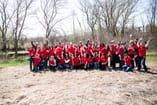
There are tons of startups out there with flashy apps designed to help millennials start saving money for retirement. But the money you put in is only one side of the retirement ledger.
“The industry helps you a lot to grow that account, and there are some very good tools to get you to whatever your secret number is,” said Jay Singh. “But the minute those people retire, they’re really facing some new challenges. You’re deciding not to work anymore, or work less, so how do you make sure that nest egg you’ve built lasts?”
Singh is the founder and CEO of Hedgeness, a Chicago-based fintech startup that uses Big Data to protect retirement savings from market swings.
For those of us who are just starting out with retirement savings, market fluctuations are not a big deal. The amount you have when you reach retirement depends on the average market performance spread across 30 or 40 years, so your bad years will be balanced out by your good ones. For people who are preparing to take money out of their retirement accounts, however, a bad year in the marketplace can make a huge difference.
To illustrate why that is, let’s assume you have a retirement account with a $1 million balance, and that you expect to need $50,000 a year for living expenses in retirement. If the returns on your investments during the first year is 5 percent, you will end the year more or less where you started. If returns are flat, you’ll have $950,000 left.
But in particularly volatile periods, retirees run the risk of major losses that can't be recovered.
By some estimates, 401(k) plans with more than $200,000 in holdings lost 25 percent of their value over the course of 2008 on average. That would bring our hypothetical retirement account balance down to $750,000.
Large swings like that are usually temporary, so those of us who are still saving for retirement can just bide our time and wait for our portfolios to bounce back. But a retiree depending on their portfolio for a fixed income is forced to sell off their assets at a discount: cashing out $50,000 in 2008 would be the same thing as cashing out more than $60,000 the year before. And there is no way to make back that price difference on assets you've already sold.
This risk is particularly large in the early days of retirement. If you're selling off your assets at a discount several years in a row, you risk burning through your savings much faster than expected.
“The question is how to handle these critical three to five years,” said Singh. “The traditional way is to become extremely conservative, making your exposure to the stock market very low. But to get through 20 years that way becomes very tough.”
Instead of shifting a retiree’s entire portfolio to low-risk, low-reward investments, Hedgeness will analyze their portfolio and identify potential worst-case scenarios based on historical data. Based on that analysis, the company’s platform can automatically offset risks by shifting small parts of the portfolio over to advanced financial instruments like options and derivatives, which won’t pay off much if the market does well, but will offset losses if the market does poorly.
To determine these investments, Hedgeness bases its analytics on market data going all the way back to the Great Depression.
Due to the complexity of the mathematical analysis involved, and the fact that trading is cheaper when executed at scale, the startup will initially focus its efforts on index funds and on firms managing very large pools of money. Singh said he is currently in dialogue with a few banks about potential pilot projects.
The strength of Hedgeness’ solution, said Singh, is that it’s based on preparing for multiple outcomes rather than making bets on where markets are headed. In his view, markets are far too unpredictable to make any reasonable bet.
“A month before the election, analysts would say there’s a 20 percent chance Trump would win. If Hillary wins, markets will be okay; if Trump wins, we will have a crash,” he said. “Markets have gone haywire since then. There’s a lot of randomness, and you have to learn how to embrace that.”
Hedgeness has a team of three in Chicago, with an additional team member who is currently based in Boston. In the next few months, Singh expects to grow that team with an additional 10 to 15 members.
Image via Shutterstock.
What's your startup's story? Let us know with a tip or a tweet @BuiltInChicago






